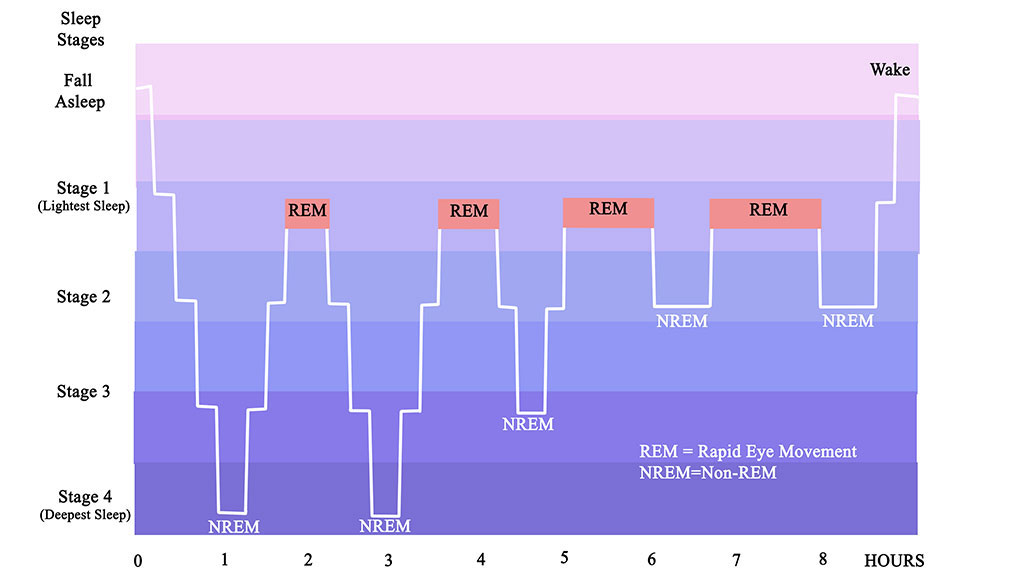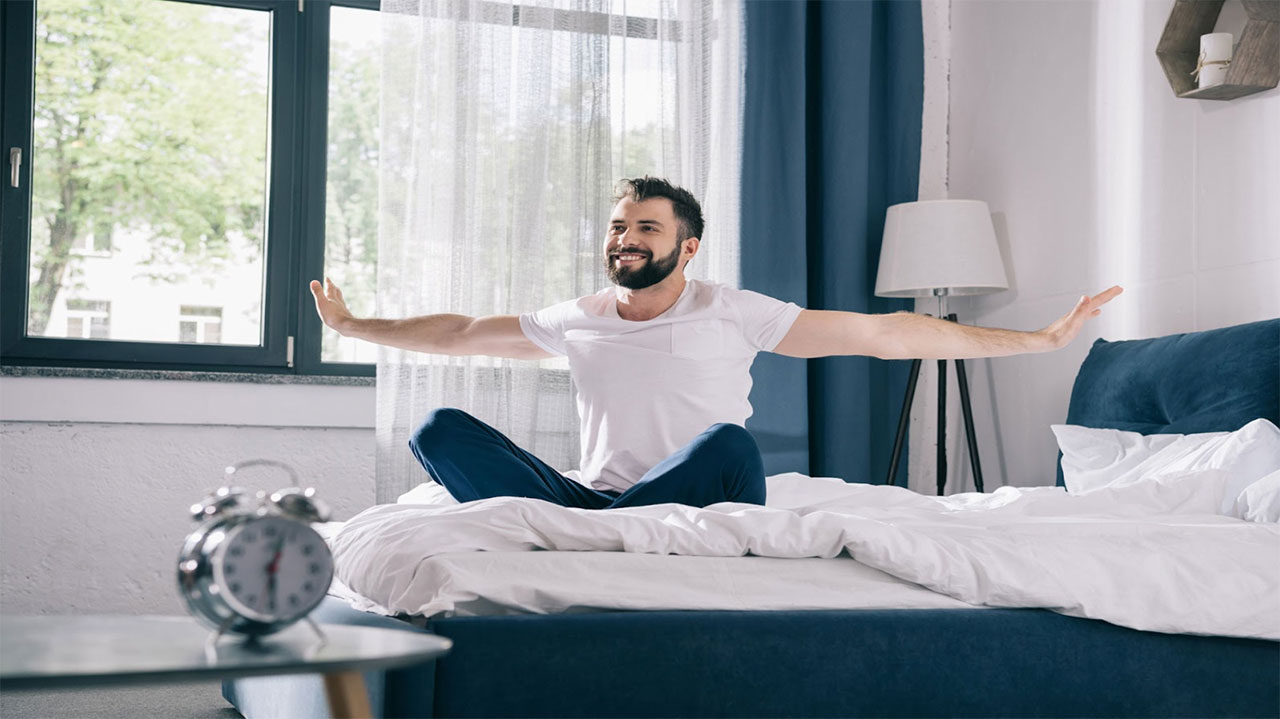Sleep is one of the most overlooked factors in the success for adults with ADHD. Without, deep, restful sleep your body and mind aren’t able to recover and this can lead to decreased executive functioning, which is worsens a common ADHD symptom.
To improve your sleep, it’s important to understand your sleep cycle, which can easily be disrupted if you have ADHD. We tend to sleep in 90-minute cycles where we move through 4 phases of sleep.
The last phase of deep, delta wave sleep is the most important for the rejuvenation of our body and the repair of our body.

When we spent more time in this stage 4 of deep sleep, we end up waking up feeling more refreshed each morning.
The problem is we live in a sleep-deprived society where there are so many demands on our time.
10 ADHD Sleep Tips, Tricks And Tools
Follow these guidelines and I can guarantee that you will dramatically improve your sleep if you are an insomniac with ADHD:
1. Don’t drink any caffeine after 3 p.m.
Limit your coffee to one to two cups per day and don’t drink any coffee after 2 p.m. since caffeine can affect your ability to fall asleep for about 5-8 hours after you drink it. If you’re really brave, remove caffeine entirely from your daily routine and there is strong evidence this will improve your overall sleep quality.
Keep in mind, you will also find caffeine in energy drinks, soda pop, chocolate, and some over-the-counter headache remedies like Aspirin.
2. Stay hydrated by drinking 8-10 glasses of water a day.
Your body is more than 60% water (your brain and heart are 73% water, and your lungs are about 83% water) so drinking enough water is crucial for optimal mind and body functioning. Frontload your water consumption earlier in the day and stop drinking liquids an hour before bed so you don’t wake up to go to the washroom.
Chronic dehydration is actually quite common and it can not only dramatically lower the quality of sleep, but also affects nearly every critical biological process in your body from digestion, cell reproduction, and flushing toxins.
3. Avoid sugar and processed carbohydrates as much as possible.
The average person today consumes a ridiculous amount of sugar. This is very bad, especially if you have ADHD. Consuming sugar spikes your blood sugar and disrupts your insulin levels, which means you’ll blood sugar will become imbalanced and this will negatively affect your sleep.
If you’re waking up in the middle of the night to eat then you probably have a mild blood sugar problem. You can usually fix this yourself by removing sugar and refined carbohydrates from your diet like muffins, donuts, crackers, cookies, and potato chips.
4. Limit your screen time 1.5-2 hours before you go to bed.
Exposure to blue light from the screens of computers, smartphones, and tablets can inhibit melatonin production, which makes it much harder to fall asleep. Blue light simulates the experience of the mid-day sun for your brain and it disrupts your natural circadian rhythm, which causes you to wake up more and have more restless sleep.
Avoid staring at screens 1.5-2 hours before you go to bed. If this isn’t practical for you, install F.lux on your computer to automatically dim your screens at night and consider getting a cheap pair of Blue Blocker sunglasses.
5. Sleep in a quiet, cool “Batcave-like” environment for optimal sleep.
If you live in a noisy and bright city, consider installing a fan to create ambient white noise and blackout curtains to block out artificial light. Ideally, you want to sleep in complete darkness. Even subtle light from an alarm clock (turn it around) or small LEDs (cover them in electrical tape) in your bedroom, should be eliminated.
Also, most people sleep best in a cool environment around 65 to 70 degrees. If you feel hungry and need to eat before bed, snack on foods that contain tryptophan (an amino acid that produces serotonin, which in turn makes melatonin) such as yogurt, milk, banana, eggs, or turkey.
6. Meditate each night for 5-10 minutes before bed.
To fast asleep fast and ensure you spend lots of your sleep time in the regenerative deep wave delta brainwave state, meditating before you go to bed is essential. Meditation allows you to switch off the problem-solving, ruminating beta brainwave state and enter into the more peaceful and relaxed alpha brain wave state, which you must pass through to fall asleep.
Another thing that meditation can do to improve your sleep is by learning diagrammatic “belly” breathing, which will do wonders for your overall mental state and energy levels. Over 90% of modern people are shallow breathers and poor breathing and inefficient oxygen intake are at the root of a lot of modern illnesses, both physical and mental.
7. Have a consistent sleep schedule all week long.
A consistent sleep schedule encourages optimal deep sleep delta brainwave activity and REM sleep, both of which are vital for optimizing your levels of neurotransmitters and hormones that help regulate your body. It also helps balance your circadian rhythm, which means you won’t get afternoon slumps and you won’t get that second wind in the late evening.
Ideally, you should go to bed at the same time each evening and wake up at the same time each morning. Even on weekends, you should not deviate from this sleep schedule by more than an hour in the morning and evening.
8. Do 20-30 minutes of moderate exercise every day.
For optimal sleep, you need at least 20-30 minutes of moderate exercise every day. I recommend doing more vigorous exercise liking going to the gym, biking, or running at least 3-4 days a week. You should also try to walk at least 6,000-10,000 steps a day. Get a free pedometer for your smartphone like Pacer to see how much you currently walk and gradually increase it.
Avoid strenuous exercise 3 hours before your bedtime. You should also try to exercise as much as possible outside (and ideally in the morning) to maximize your sun exposure, which will ensure healthy vitamin D levels.
9. Get an alarm clock based on your sleep cycles.
Alarm clocks often wake us up in the middle of a deep sleep cycle, which causes morning grogginess. Ideally, if you’re keeping a regular sleep schedule you will naturally wake up at the right time.
Otherwise (and as a backup), I recommend getting an app like Sleep Cycle Alarm for your iPhone or Android, which will roughly track your sleep cycles and wake you up in a 30-minute window of time when you’re in light sleep. Just make sure your smartphone is on airplane mode and never check your notifications while you’re in bed (ideally, don’t use any technology in your bedroom).
10. Eat whole foods and take essential supplements.
It is recommended that you eat a diet of nutrition-dense whole feeds and at least 8-10 servings of fruit and vegetables each day. This is crucial for your overall health and will ensure you get high-quality sleep as well. If you’re eating out a lot and not getting enough servings of fruit and vegetables you should be taking supplements.
For falling asleep, I’d recommend taking Magnesium every evening about an hour or two before bedtime. A good multivitamin can also help along with supplementation of essential vitamins like vitamin D, B vitamins, and daily fish oil omega-3 products. If you are dealing with a lot of stress, consider using an adaptogen like Rhodiola Rosea, Siberian Ginsing, or Ashwagandha.




